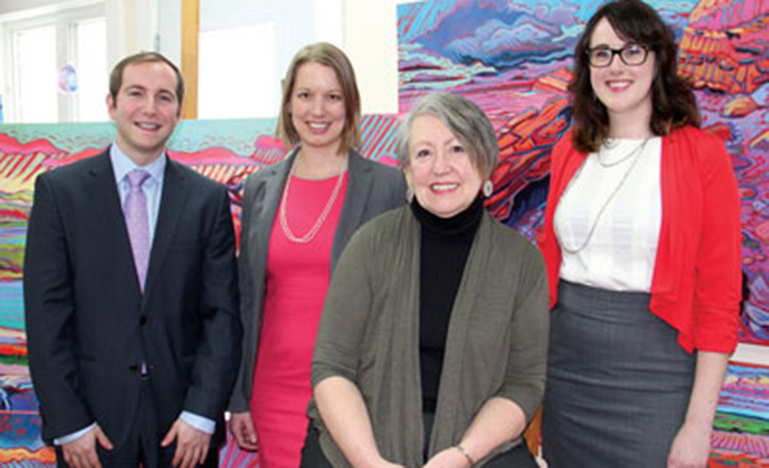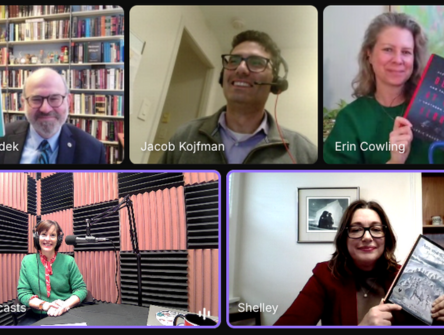Making a Difference: Kelsey McLaren, Daniel Pink and Noémi Westergard
Lawyers helping artists

The not-for-profit Artists’ Legal Information Society (ALIS) provides free legal services to artists in Atlantic Canada. Kelsey McLaren, Daniel Pink and Noémi Westergard generously give their time and experience to help artists with issues of copyright, intellectual property, contracts, royalties and more,. They also offer a variety of workshops and library resources. Access to dedicated legal help ensures that artists’ voices are heard and that their interests are protected. Since its inception in 2010, ALIS has proved vital to many artists in the Atlantic arts community.
Why did you decide to help artists?
Daniel Pink, associate at Wickwire Holm: One of the first things that we learned about at the Schulich School of Law at Dalhousie was the Weldon Tradition of community service and the importance of being willing to serve and work to improve the communities in which we practise as lawyers. This was a message that resonated with me
personally, as it is also one that my family instilled in me while I was growing up. I have always been a big fan of the arts and have tried to get involved with different projects throughout the years. Unfortunately, my artistic abilities leave much to be desired so I decided that I could play a role in the art world by removing the legal barriers that artists face and allowing them to spend more time working on their art and less time worrying about the legalese.
How did the three of you come to work together on ALIS?
Kelsey McLaren, associate at Pink Larkin: The three of us independently noticed that there was no organization at the Schulich School of Law at Dalhousie, or anywhere in Atlantic Canada, that provided legal help to artists. Daniel Pink first started ALIS while he was still in law school, unbeknownst to Noémi and I, so when we were looking into starting an organization with the same mandate and heard about ALIS, we immediately joined him. We have modelled ALIS after ALAS in Toronto, ALO in Vancouver, and C-JAM in Montreal.
How do you feel ALIS makes a difference?
Noémi Westergard, associate at Blois, Nickerson & Bryson LLP: I know that ALIS makes a difference because we are getting more people being referred to us. We are giving artists a chance to understand the contracts they are signing, understand and know their rights — when they should be saying “no” or when they should be requesting additional clauses within the contracts. Knowledge is power and by providing the knowledge, we are hoping the artists will be able to make more informed decisions in the future and feel like they not only understand what they are being offered but have some knowledge of whether the offer is fair.
An ounce of prevention is worth a pound of cure
That’s one of the theories behind the Ethical Practices Self-Evaluation Tool developed by the CBA’s Ethics and Professional Responsibility committee — that a little preventative “medicine” goes a long way when it comes to healthy ethical law firm culture.
“You can have all the formal policies and procedures in place, but unless there’s really a culture of dedication to ethical practice, you may not see these ethical duties being fulfilled,” says Amy Salyzyn, a J.S.D. candidate at Yale Law School who served as research director on the project. “Also, when an organization takes on the idea of self-assessing its ethical infrastructure it’s signalling to the people in the organization that this is a very important thing, it’s something they take seriously.”
Various states in Australia have been using similar tools to great success, says Salyzyn. One study in New South Wales showed that law firms which used the self-assessment tool were able to cut their complaints by one third.
“What they’ve found is the process of having … law firm managers actually reflect on what they have in place in their firms really inspires them to create better policies and procedures.”
The goal of the CBA’s ethical self-assessment tool is to get law firm managers to think about where there might be gaps in their ethical infrastructure — a “fancy” term, says Salyzyn, for the procedures, policies and structures that a law firm may have in place to ensure that lawyers and other employees fulfil their ethical duties. The tool offers information about best practices, and links to online resources that provide additional guidance. It also highlights 10 areas where the research showed common ethical concerns.
“We’ve tried to create a flexible instrument that can be used across practice types,” says Salyzyn. “It’s not meant to be a simple master list, a one-size-fits all scenario, but really meant to be a flexible instrument that both small firms and large law firms can use.”
Some of the practice issues highlighted in the tool are things like competence and communications — frequent sources of client frustration.
“We know communications issues are one of the most prime sources of frustration for clients, but they’re not necessarily the type of thing that gets captured in a rule violation that rises to a law society complaint. The interesting thing about this instrument is that it gets to a lot of problems that are there that aren’t captured by our current regulatory system.”
For the full interview of Amy Salyzyn by Kim Covert: http://ow.ly/pWElF
CBA Board of Directors 2013-2014
The 2013-2014 Board of directors met at the CBA Legal Conference in Saskatoon. To read full bios and goals of branch presidents and incoming chairs, visit CBA & You at nationalmagazine.ca.
Clarification
Law Students for Technology and Innovation focuses on how technology might be used to deliver cost-effective legal services. The Queen’s University group explores new legal service delivery methods, but does not deliver legal services. The article appeared in the 2013 Students’ issue of National.
Canada ratifies World Bank’s treaty on investment disputes
Barry Leon and John Siwiec
On December 1, 2013, Canada became the 150th country to join the Convention on the Settlement of Investment Disputes Between States and Nationals of Other States (ICSID Convention). Canada’s ratification of the ICSID Convention will reduce the risks to Canadian companies investing abroad and promote greater stability and predictability for their investments.
Canadian investors abroad will have access to impartial binding arbitration through the International Centre for Settlement of Investment Disputes (ICSID), a part of the World Bank, to resolve their investment claims against foreign host countries. ICSID is the leading international institution for investor-state disputes.
The key benefit of the ICSID Convention is that each member country is committed to recognize as binding and enforce an ICSID arbitral award as if it were a final judgment of that country’s courts.
ICSID arbitration can be used for investors’ claims under most of Canada’s 29 international investment agreements, including NAFTA Chapter Eleven.
As Canadian companies increasingly invest abroad, it becomes increasingly important for them to obtain specialized advice on ways to reduce their risk by taking advantage of investment treaty protections and utilizing international arbitration for their commercial disputes.
The CBA has urged the government to ratify the convention since 2005, and through those advocacy efforts, played an important role in getting it on the government’s agenda.
http://www.cba.org/CBA/submissions/pdf/12-06-eng.pdf
Barry Leon is Chair of the CBA working group on ICSID. He is a partner and head of the International Arbitration Group and John Siwiec is an associate in the International Arbitration Group at Perley-Robertson, Hill & McDougall LLP in Ottawa.
Mortgage Fraud!
Making sure you’re covered.
Mortgage fraud accounts for two-thirds of the cost of all fraud in Canada, even though it represents just 13 per cent of fraud activity, according to Equifax Canada Inc., a consumer credit company.
The cost of mortgage fraud in Canada rose 150 per cent between 2010 and 2011, and jumped another 50 per cent in 2012, to $600-million, according Equifax data.
The federal government’s tightening of lending rules in response to record consumer debt levels may be in part responsible for the increases, as it leads to “more people … kind of fudging things to get a home,” John Russo, Equifax’ vice-president and legal counse, told the Financial Post.
It makes the role of legal professionals and title insurance companies critical, says Stewart Title Guaranty Company, whose Stewart Assyst Real Estate application, powered by Telus, is a supporting sponsor of the CBA. Fraud accounted for nearly one-third of all claims in terms of dollars paid in 2008, the company says on its website.
“The coverage provided in residential title insurance policies helps protect both innocent homeowners and lenders who might otherwise face huge financial losses resulting from title fraud.”
Exclusive benefits for Universal Membership Jurisdiction in the new fee structure
The CBA recognizes that NewBrunswick is in a special position as a CBA Universal Membership Jurisdiction. As such, under the new membership model, CBA is offering a new and exclusive benefit to all New Brunswick members: one complimentary online Professional Development (PD) session of 1.5 hours or less per membership year, from any branch of the CBA or CCCA, excluding sessions offered by CBA National Office.
As of November 1, 2013, New Brunswick Branch members will be able to take advantage of their complimentary session. To view eligible PD sessions, visit the CBA PD website at www.cbapd.org.
Also as a Universal Membership Jurisdiction, the New Brunswick Branch will be provided with an annual allocation from CBA National Office which will be dedicated to the development and delivery of special online PD programs that will be provided free of charge to New Brunswick members.
For more information on the exclusive benefits for Universal Membership Jurisdiction, please visit http://www.cbamembership.org/Branches/New-Brunswick.aspx


